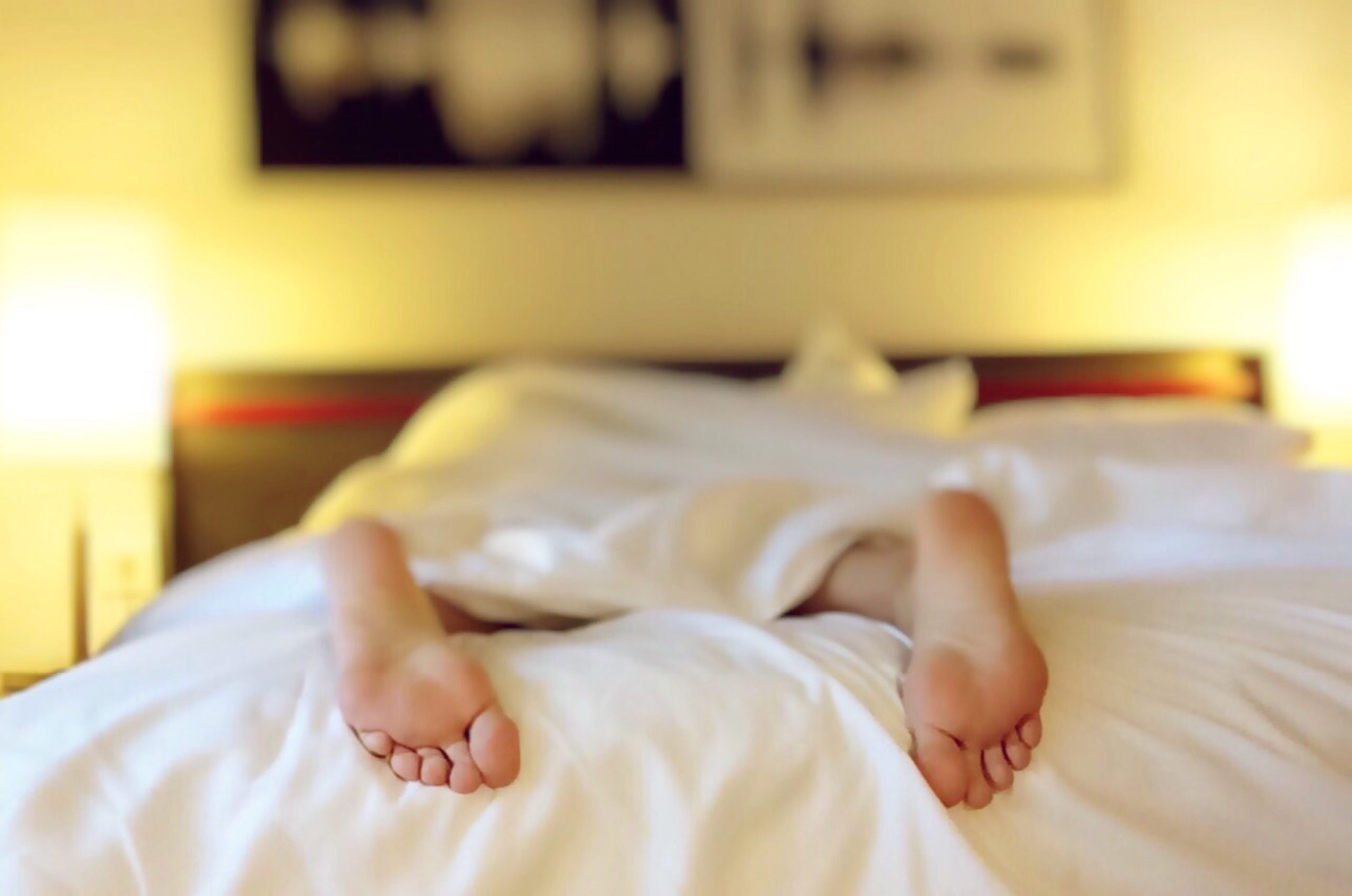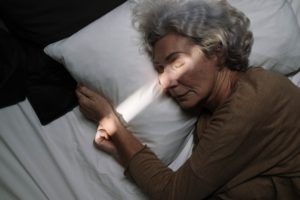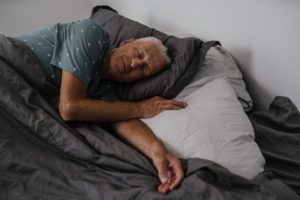Sleep Apnea and Alzheimer’s

Written by Anna Bullough
Did you know that if your loved one suffered from sleep apnea during mid-life, they could be at a higher risk of developing Alzheimer’s disease in their later years?
As a caregiver, you may already be aware of the connection between sleep apnea and cognitive decline, but understanding the underlying reasons behind it can be challenging.
If you are caring for an older loved one who has both sleep apnea and Alzheimer’s disease, there are steps you can take to improve sleep apnea in elderly individuals.
Let’s delve into this common issue and explore practical tips that caregivers – like you – can use to address sleep apnea dementia symptoms.
What Is Sleep Apnea?
Sleep apnea is a sleep disorder that affects breathing during sleep. It causes a person’s airway to become blocked or narrow, which can interrupt breathing for brief periods throughout the night. These interruptions in breathing can occur dozens or even hundreds of times each night, causing the person to wake up briefly and disrupt their sleep. As a result, individuals with sleep apnea may feel exhausted during the day, experience difficulty concentrating, and even fall asleep during activities such as driving or working. Sleep apnea is a serious condition that requires medical attention to manage and improve quality of life.
 Diagnosis
Diagnosis
The most common way to diagnose sleep apnea is a sleep study known as polysomnography. This non-invasive procedure measures different functions of your body, including heart rhythm and rate, respiration, leg movement, oxygen and carbon dioxide levels, brain waves, and chin and eye movements. The results of these measurements will determine the presence and severity of sleep apnea.
Treatment of Obstructive Sleep Apnea
-
- limiting the consumption of alcohol, tobacco, sedatives, and muscle relaxants
- losing weight
- sleeping on one’s side (sometimes with the help of a tennis ball sewn onto the back of pajamas or a “fanny pack” worn to bed)
- elevating the head of the bed
- physical training (even in the absence of significant weight loss)
These steps can go a long way in improving the quality of sleep and overall health for people with obstructive sleep apnea. Elderly dementia patients can also experience sleep apnea relief from these small changes.
Treatment of Central or Mixed Apnea
The treatment of central or mixed apnea can be more challenging than obstructive sleep apnea, as it involves addressing the underlying cause of the condition. In some cases, treatment may not be possible, and the focus may be on managing symptoms and improving quality of life.
Central sleep apnea can be associated with medical conditions such as heart failure, stroke, or Parkinson’s disease. Treating these underlying conditions may improve central sleep apnea. For some individuals, supplemental oxygen or medication to stimulate breathing may be recommended.
Mixed apnea, as the name suggests, involves a combination of obstructive and central apnea. Treatment typically involves addressing the obstructive component through the use of continuous positive airway pressure (CPAP) or bilevel positive airway pressure (BiPAP) therapy. In some cases, supplemental oxygen or medication to stimulate breathing may also be recommended to address the central component of mixed apnea.
It is important to work closely with a healthcare provider to develop an individualized treatment plan for central or mixed apnea, taking into account the underlying cause of the condition, the severity of symptoms, and other medical factors.
What Is the Connection Between Sleep Apnea and Alzheimer’s?
For a long time, medical experts have recognized that Alzheimer’s and obstructive sleep apnea have a strong connection. New research is helping us understand how these diseases are related.
While it is unlikely that sleep apnea causes dementia, the lowered oxygen levels and interrupted sleep seem to worsen the brain’s ability to work well. Studies have found that sleep apnea can hurt the brain and cause problems with memory. It does this by making a part of the brain called the hippocampus shrink. This part of the brain is crucial for remembering things.
People who have Alzheimer’s disease have too much of a protein called beta-amyloid 42, which forms clumps that collect between nerve cells and cause problems. In a recent study published in the journal Sleep, scientists found that people with worse sleep apnea have more of these clumps in the hippocampus. Lack of sleep makes it hard for the brain to remove the protein, and sleep apnea can also stress and harm the hippocampus and other parts of the brain.
Other studies have also linked obstructive sleep apnea to different cognitive impairments, including memory loss, difficulty with decision-making, and learning new information.
What this tells us is that while sleep apnea doesn’t cause Alzheimer’s, sleep apnea weakens the memory part of the brain and strengthens Alzheimer’s-related protein in the brain. Both of these things negatively impact memory and can make Alzheimer’s worse.
Is Sleep Apnea Dementia Reversible?
Studies have found that using a device called continuous positive airway pressure (CPAP) can improve the thinking abilities of someone with Alzheimer’s who also has obstructive sleep apnea.
A CPAP is a breathing device worn over the mouth or nose, providing constant pressurized air to support nighttime breathing. CPAP treatment can reduce daytime sleepiness, a common complaint of Alzheimer’s patients and their caregivers.
Although CPAP treatment does not treat the underlying cause of Alzheimer’s disease, improving patients’ sleep patterns may also improve their overall cognitive functioning.
 Helping Your Loved Ones
Helping Your Loved Ones
As scientists continue to investigate the link between sleep apnea and Alzheimer’s disease, there are steps that you can take to support your loved one who suffers from both conditions.
First, it is crucial to make sure they receive medical care to manage their sleep apnea. This can help to improve the quality of their sleep and reduce the risk of further cognitive damage.
As a primary caregiver for someone with Alzheimer’s disease and sleep apnea, it is also important to focus on the following:
Promoting a Healthy Lifestyle
Obesity or being overweight can worsen sleep apnea symptoms. Encourage your loved one to maintain a healthy weight through regular exercise and a balanced diet. This simple step can significantly reduce the frequency of sleep apnea episodes. Also, smoking and excessive alcohol consumption can escalate sleep apnea symptoms, so it is advisable to quit smoking and limit alcohol intake.
Following a Consistent Routine
As the condition progresses, your loved one may become frustrated with the loss of their mental and physical abilities. However, maintaining a regular routine can help them feel more secure and calm. People with Alzheimer’s disease and other forms of dementia thrive on familiarity and routine, and it can reduce agitation and anxiety.
Ensuring a Safe Home Environment
Individuals with Alzheimer’s disease may experience balance loss and reduced motor skills depending on the stage of their condition. Therefore, it is essential to evaluate their home for safety hazards, such as loose rugs, broken steps, and installing grab bars in key areas where your loved one spends most of their time.
Anticipating their Needs
There may be times when your loved one becomes agitated, and it can be challenging to understand why, especially when they are experiencing sleep deprivation due to sleep apnea. It is essential to be patient and ask them questions that help them articulate their specific needs.
Investing in an Alert System
If your loved one spends time alone and you are concerned about their safety, especially at night, consider investing in a home alert system. This allows them to call for help by pressing a button that alerts a 24/7 monitoring center, and if necessary, a first responder will be dispatched to their home.
Getting Respite Help
It is equally important to take care of yourself as it is to meet your loved one’s needs. Respite care provides access to experienced and compassionate caregivers who can step in and help when needed. Whether it’s regular weekly breaks or when you’re away on vacation, finding someone you can trust will improve your well-being and quality of life.
Supporting a loved one with both Alzheimer’s disease and sleep apnea requires a comprehensive approach that addresses their medical needs and lifestyle choices. The recommendations above can all contribute to a better quality of life for your loved one and yourself. By taking these steps, you can help your loved one manage their condition while also prioritizing your own well-being.
Getting the Support You Need
The link between sleep apnea, elderly Alzheimer’s disease, and other cognitive issues is a complex and growing area of research. Until we better understand how to prevent and treat these diseases, lean on the support and expertise of your doctors. You as a caregiver can do a lot to promote a healthy and safe lifestyle for your loved one and yourself.
At Suzy’s Senior Services, we understand the challenges that come with caring for someone with Alzheimer’s disease and sleep apnea. Our team of experienced and compassionate caregivers can provide at-home care that caters to your loved one’s unique needs. Whether it’s assistance with daily activities, medication management, or respite care, we are committed to ensuring that your loved one receives the best possible care while also supporting your own well-being as a caregiver. Contact us today to learn more about our services and how we can assist you in caring for your loved one. Call us at 801-540-2077 to learn more.
 Grateful for Suzy’s Senior Companion Services!
Grateful for Suzy’s Senior Companion Services!
“Thank you, Suzy, for the services you provide. I’m so grateful I found your services – I don’t know what I would do without those special ladies who come and help me and my hubby.
Your people come in like a breath of fresh air – all bubbly and happy – not only lifting up our spirits but cleaning and bathing Jim too.
I still cry every time Aimee and Jayme make my bed.
The other Amy is so good with Jim. She gets him into a bath twice a week and manages to get him clean and shiny, which was just a big struggle for me. She gets Jim talking about his past and they laugh together.
These services allow me to take a breath and focus on other things that are slipping out of control.
Again, I’m so very grateful for the fact that you, Suzy, are willing to provide these services and find fantastic employees to come in and give loving care to people they don’t even know!”
– J. Eborn
For at-home services near Bountiful, call us at 801-540-2077 to learn more.
